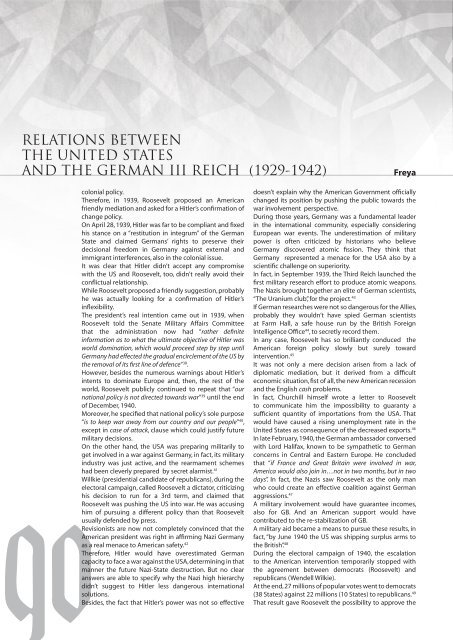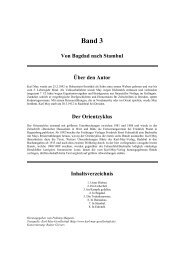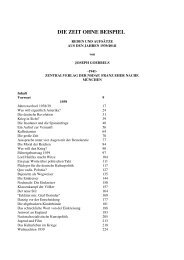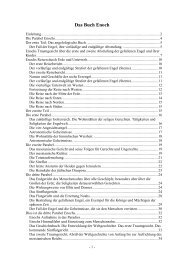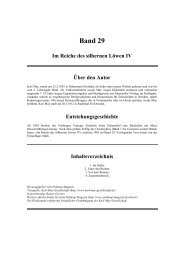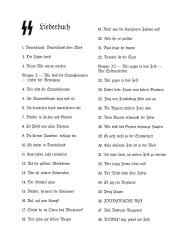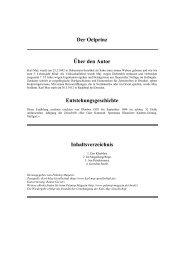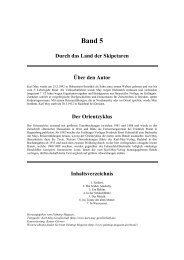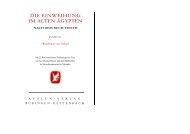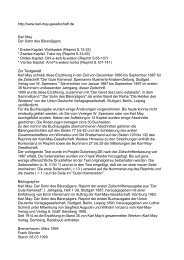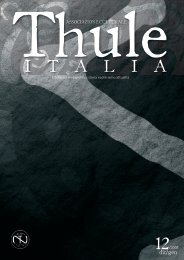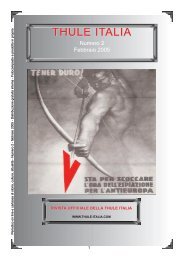Thule Italia feb2006.indd - Thule-italia.net
Thule Italia feb2006.indd - Thule-italia.net
Thule Italia feb2006.indd - Thule-italia.net
Create successful ePaper yourself
Turn your PDF publications into a flip-book with our unique Google optimized e-Paper software.
RELATIONS BETWEEN<br />
THE UNITED STATES<br />
AND THE GERMAN III REICH (1929-1942) in<br />
colonial policy.<br />
Therefore, in 1939, Roosevelt proposed an American<br />
friendly mediation and asked for a Hitler’s confirmation of<br />
change policy.<br />
On April 28, 1939, Hitler was far to be compliant and fixed<br />
his stance on a “restitution in integrum” of the German<br />
State and claimed Germans’ rights to preserve their<br />
decisional freedom in Germany against external and<br />
immigrant interferences, also in the colonial issue.<br />
It was clear that Hitler didn’t accept any compromise<br />
with the US and Roosevelt, too, didn’t really avoid their<br />
conflictual relationship.<br />
While Roosevelt proposed a friendly suggestion, probably<br />
he was actually looking for a confirmation of Hitler’s<br />
inflexibility.<br />
The president’s real intention came out in 1939, when<br />
Roosevelt told the Senate Military Affairs Committee<br />
that the administration now had “rather definite<br />
information as to what the ultimate objective of Hitler was<br />
world domination, which would proceed step by step until<br />
Germany had effected the gradual encirclement of the US by<br />
the removal of its first line of defence”<br />
90<br />
38 .<br />
However, besides the numerous warnings about Hitler’s<br />
intents to dominate Europe and, then, the rest of the<br />
world, Roosevelt publicly continued to repeat that “our<br />
national policy is not directed towards war” 39 until the end<br />
of December, 1940.<br />
Moreover, he specified that national policy’s sole purpose<br />
“is to keep war away from our country and our people” 40 ,<br />
except in case of attack, clause which could justify future<br />
military decisions.<br />
On the other hand, the USA was preparing militarily to<br />
get involved in a war against Germany, in fact, its military<br />
industry was just active, and the rearmament schemes<br />
had been cleverly prepared by secret alarmist. 41<br />
Willkie (presidential candidate of republicans), during the<br />
electoral campaign, called Roosevelt a dictator, criticizing<br />
his decision to run for a 3rd term, and claimed that<br />
Roosevelt was pushing the US into war. He was accusing<br />
him of pursuing a different policy than that Roosevelt<br />
usually defended by press.<br />
Revisionists are now not completely convinced that the<br />
American president was right in affirming Nazi Germany<br />
as a real menace to American safety. 42<br />
Therefore, Hitler would have overestimated German<br />
capacity to face a war against the USA, determining in that<br />
manner the future Nazi-State destruction. But no clear<br />
answers are able to specify why the Nazi high hierarchy<br />
didn’t suggest to Hitler less dangerous international<br />
solutions.<br />
Besides, the fact that Hitler’s power was not so effective<br />
Freya<br />
doesn’t explain why the American Government officially<br />
changed its position by pushing the public towards the<br />
war involvement perspective.<br />
During those years, Germany was a fundamental leader<br />
in the international community, especially considering<br />
European war events. The underestimation of military<br />
power is often criticized by historians who believe<br />
Germany discovered atomic fission. They think that<br />
Germany represented a menace for the USA also by a<br />
scientific challenge on superiority.<br />
In fact, in September 1939, the Third Reich launched the<br />
first military research effort to produce atomic weapons.<br />
The Nazis brought together an elite of German scientists,<br />
“The Uranium club”, for the project. 43<br />
If German researches were not so dangerous for the Allies,<br />
probably they wouldn’t have spied German scientists<br />
at Farm Hall, a safe house run by the British Foreign<br />
Intelligence Office 44 , to secretly record them.<br />
In any case, Roosevelt has so brilliantly conduced the<br />
American foreign policy slowly but surely toward<br />
intervention. 45<br />
It was not only a mere decision arisen from a lack of<br />
diplomatic mediation, but it derived from a difficult<br />
economic situation, fist of all, the new American recession<br />
and the English cash problems.<br />
In fact, Churchill himself wrote a letter to Roosevelt<br />
to communicate him the impossibility to guaranty a<br />
sufficient quantity of importations from the USA. That<br />
would have caused a rising unemployment rate in the<br />
United States as consequence of the decreased exports. 46<br />
In late February, 1940, the German ambassador conversed<br />
with Lord Halifax, known to be sympathetic to German<br />
concerns in Central and Eastern Europe. He concluded<br />
that “if France and Great Britain were involved in war,<br />
America would also join in…not in two months, but in two<br />
days”. In fact, the Nazis saw Roosevelt as the only man<br />
who could create an effective coalition against German<br />
aggressions. 47<br />
A military involvement would have guarantee incomes,<br />
also for GB. And an American support would have<br />
contributed to the re-stabilization of GB.<br />
A military aid became a means to pursue these results, in<br />
fact, “by June 1940 the US was shipping surplus arms to<br />
the British”. 48<br />
During the electoral campaign of 1940, the escalation<br />
to the American intervention temporarily stopped with<br />
the agreement between democrats (Roosevelt) and<br />
republicans (Wendell Wilkie).<br />
At the end, 27 millions of popular votes went to democrats<br />
(38 States) against 22 millions (10 States) to republicans. 49<br />
That result gave Roosevelt the possibility to approve the<br />
30 Address by Adolf Hitler,<br />
Chancellor of the Reich,<br />
before the Reichstag,<br />
September 1, 1939.<br />
Document available at<br />
“The Avalon Project” at Yale<br />
Law School, on-line: http://<br />
www.yale.edu/lawweb/<br />
avalon/wwii/gp2.htm<br />
last accessed: 2005-11-17.<br />
31 SUMNER WELLES (1892-<br />
1961) was Under Secretary<br />
of State in US, 1937-1943,<br />
during the Franklin D.<br />
Roosevelt<br />
administration. He is known<br />
to have architected the<br />
economic “Good Neighbour”<br />
clause policy and for his<br />
assignment to the<br />
American embassy in Cuba.<br />
32 ARNOLD A. OFFNER,<br />
Appeasement Revisited: The<br />
United States, Great Britain,<br />
and Germany, 1933-1940, The<br />
Journal of American<br />
History, Vol. 64, No. 2, Sep.<br />
1977, Organization of<br />
American Historians, 379.<br />
33 FREDERICK W. MARKS,<br />
Six between Roosevelt and<br />
Hitler: America’s Role in<br />
the Appeasement of Nazi<br />
Germany,<br />
The Historical Journal,<br />
Vol. 28, No. 4, Dec. 1985,<br />
Cambridge University<br />
Press, 978.<br />
34 GIUSEPPE MAMMARELLA,<br />
Destini incrociati- Europa<br />
e Stati Uniti nel XX secolo,<br />
Laterza, Bari, 2000, 100.<br />
35 RENÉ-CARRIÉ ALBRECHT , A<br />
Diplomatic History of Europe<br />
since the Congress of Vienna,<br />
Marper & Brothers<br />
Publishers, NY, 1958, 448.<br />
36 GIUSEPPE MAMMARELLA,<br />
Destini incrociati- Europa<br />
e Stati Uniti nel XX secolo,<br />
Laterza, Bari, 2000, 102.<br />
37 ROBERT E. HERZSTEIN,<br />
Roosevelt & Hitler- prelude<br />
to war, Paragon house, New<br />
York, 1989, 245-246.<br />
38 STEVEN CASEY, Franklin D.<br />
Roosevelt, American Public<br />
Opinion, and the War against<br />
Nazi Germany- Cautious<br />
Crusade, Oxford University<br />
Press, 2001, 9.<br />
39 Ibid, 38.<br />
40 Ibid, 38.<br />
41 ROBERT E. HERZSTEIN,<br />
Op.cit, 245-246.<br />
42 ERNEST R. MAY , Nazi<br />
Germany and the United<br />
States: A Review Essay, The<br />
Journal of Modern History,<br />
Vol. 41,<br />
No. 2, Jun., 1969, The<br />
University of Chicago<br />
Press, 211.<br />
43 THOMAS POWERS, La storia<br />
segreta dell’atomica tedesca,<br />
Mondatori, Milano, 1993.<br />
44 JEREMY BERNSTEIN, Hitler’s<br />
Uranium Club- The secret<br />
recordings at Farm hall, AIP<br />
Press, Woodbury, NY,<br />
1966.<br />
45 JERALD A. COMBS,<br />
American Diplomatic History,<br />
University of California Press,<br />
Berkeley and Los Angeles,<br />
1983, 208.<br />
lingua<br />
Lend Lease Act, proposed on December 29, 1940. It would<br />
appropriate $7 billion for war supplies and the President<br />
would be authorized to lend or lease these supplies.<br />
Through it, the USA would have financed a war without<br />
war debts. 50 From that moment the heavy industry began<br />
to work hardly and this could be seen as the American<br />
clear non-neutrality array.<br />
Because it was necessary to Roosevelt the support of the<br />
public opinion, he pushed American public towards that<br />
attitude through a “fear” strategy.<br />
This thesis is supported by the assumption that people<br />
“needed to sense an imminent danger” 51<br />
German newspapers calling Roosevelt “another Professor<br />
Wilson” and “Wilson the Second” denounced the “fear”<br />
tactics for which Roosevelt told a group of senators that<br />
Hitler contemplated a future attack on “Central and South<br />
America”.<br />
On the other hand, in the USA, at the time, a group<br />
of “divisionists” thought less dangerous Nazism than<br />
Bolshevism, especially after Red Army’s pushing back<br />
of Wehrmacht in December and January 1941. They<br />
suggested and auspicated a negotiated peace with<br />
Germany that would leave not only the Third Reich but<br />
also its conquests essentially intact. 52<br />
To avoid the perspective that the “divisionist pressure”<br />
would have gained ground in public opinion, Roosevelt<br />
and the Press Offices elaborated a proper strategy. In<br />
fact, the OFF (Office of Facts and Figures) 53 devised<br />
three themes that Roosevelt had stressed “to provide<br />
the public with a clearer picture of the enemy, namely,<br />
statement of the US objectives, including an assessment<br />
of the impact that Axis militarism would have on every<br />
day American life; the nature of the enemy, particularly the<br />
fact that the Nazis were bent on world domination; and<br />
the Allies’ counterstrategy, especially the need to stop the<br />
Wehrmacht with vigorous offensive operations. 54<br />
Like that, Roosevelt publicly “denounced” Hitler’s attempt<br />
to destroy all elective systems of government on every<br />
continent, including the American one, contributing,<br />
in that manner, to rise American fear and pro-war<br />
sentiments. 55<br />
As reported by Dr. Goebbels to an American interviewer,<br />
Nazis didn’t expected the “wilful misstatements of facts” 56<br />
The American involvement could have been justified, in<br />
the opinion of the American public, only by a direct attack<br />
against the USA. But Hitler refused to do also after many<br />
provocations, as it has been agreed in the World Jewish<br />
Congress of 1936 in the US, where Jews organized a<br />
boycott of German goods to prompt the Nazis “to even<br />
harsher policies”. 57<br />
Because Roosevelt could not lure Germany to create<br />
an incident that would bring the United States into the<br />
war, he provoked Japan to take indirectly the war way.<br />
To obtain it, he used “economic weapons to stop the<br />
Japanese invasion of Manchuria. 58<br />
The theory for which the USA provoked Hitler to cause a<br />
military conflict forcing the Fuhrer’s hand is supported by<br />
the fact that, at the same time, he has also ordered the<br />
extension of naval operations. 59<br />
That was a part of direct and indirect provocative measures<br />
taken by Roosevelt; in fact, according to that, he ordered a<br />
secret attack to German submarines.<br />
On the other hand, Hitler has confided to Foreign Minister<br />
Joachim von Ribbentrop that he was dubious about<br />
an intervention lined up with the Japan(in fact, the<br />
agreement previewed an involvement after a received<br />
and not for a provoked attack). Therefore, he affirmed that<br />
the principal reason of German intervention was exactly<br />
the American bombing against German ships. Hitler has<br />
concluded saying that the USA provoked the war with<br />
their attitude. 60<br />
Effectively the American involvement nearby GB evidently<br />
came true with the signature of the 1941’s Atlantic Charter<br />
agreement.<br />
Roosevelt’s decision to get involved would have been also<br />
a means to preserve the British Empire and to secure the<br />
market control. At the same time, Roosevelt’s own election<br />
would have been guaranteed. 61<br />
The theory of a secret search by Roosevelt for the<br />
American involvement in the war is supported by the<br />
assumption that, at Pearl Harbour, he really “offered the<br />
fleet as a sacrifice to guarantee America’s entry into the<br />
war.” 62 In fact, Roosevelt ordered the Pacific fleet to leave<br />
San Diego and to allocate permanently at Pearl Harbour,<br />
going “against the wishes of the high naval command”. 63<br />
Therefore, it could be said that President Roosevelt not<br />
only knew about the imminent attack, but also really<br />
hoped for it in order to have the “casus belli” and enter the<br />
war, just as officially happened in December 1941. 64<br />
However, the American financial support to the military<br />
machinery of Germany went on at least until the USA<br />
entered the war. In particular, because the Nazi question<br />
was largely contrasted in the American public opinion,<br />
for example, the Union Banking Corporation (UBC) was<br />
alleged to be a Nazi organization, and an “interlocking<br />
trust” with the German Steel Trust, because of its funds<br />
and investments’ management 65 .<br />
In fact, that organization had illegally, transferred aviation<br />
fuel technology to the German Luftwaffe and also bought<br />
and shipped overseas gold, steel, coal, US treasury and<br />
war bonds.<br />
The exportation was illegal since 1938 when, according


